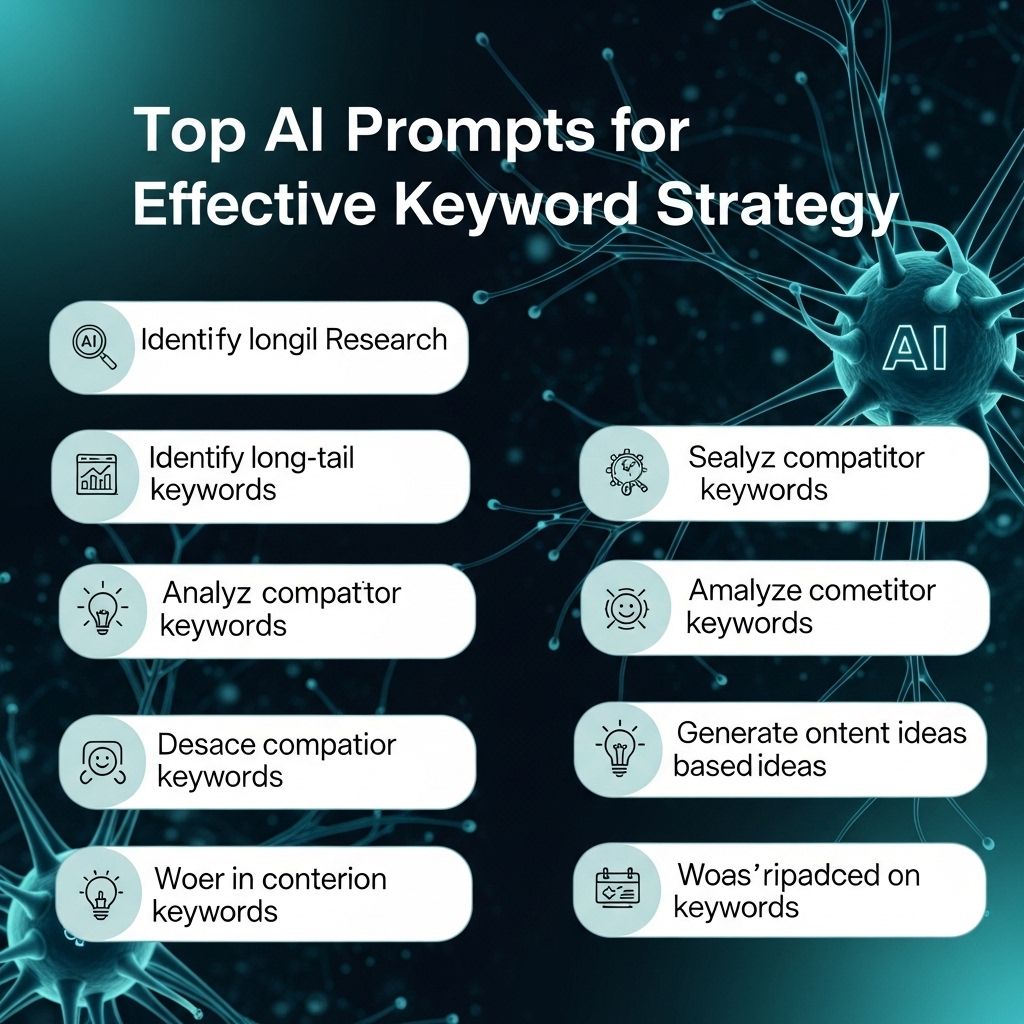In the rapidly evolving digital landscape, businesses and marketers are constantly seeking innovative ways to enhance their online visibility. One of the most effective methods is through a well-defined keyword strategy, which serves as the backbone of search engine optimization (SEO). Leveraging artificial intelligence (AI) to refine and optimize keyword strategies can lead to more effective content creation and better engagement rates. In this article, we will explore various AI prompts that can help you develop an effective keyword strategy for your business.
The Importance of Keyword Strategy
Before diving into the AI prompts, it is essential to understand why a robust keyword strategy is crucial for your online presence. Keywords are the terms and phrases that potential customers use to find information, products, or services online. An effective keyword strategy will:
- Enhance visibility on search engines
- Increase organic traffic to your website
- Improve the relevance of content to user queries
- Help to target specific audiences more effectively
Utilizing AI for Keyword Research
AI tools have revolutionized keyword research by providing insights that were previously difficult to obtain. These tools can analyze vast amounts of data to identify trending keywords, search volumes, and user intent. Here are some AI prompts you can use:
1. Generate Keyword Ideas
Using AI, you can generate a list of potential keywords based on your niche. Consider prompting the AI with:
“What are the top keywords related to [your industry or topic]?”
The response will provide you with a range of keywords that you may not have considered, expanding your research horizons.
2. Analyze Competitor Keywords
Understanding what keywords your competitors are targeting can offer valuable insights. You can ask:
“What keywords are my competitors ranking for in [your market]?”
This will help you identify gaps in your strategy and find opportunities to target underutilized keywords.
3. Assess Keyword Difficulty
Not all keywords are created equal; some are highly competitive, while others are easier to rank for. Use the following prompt:
“What is the keyword difficulty for [specific keyword]?”
This information is crucial for prioritizing which keywords to focus on based on your site’s authority.
Refining Your Keyword List
Once you have generated a list of keywords, the next step is to refine that list to ensure it aligns with your goals. AI can assist in this process as well.
4. Identify Long-Tail Keywords
Long-tail keywords often have lower competition and can attract more targeted traffic. To identify them, prompt the AI with:
“What are some long-tail variations of [main keyword]?”
Long-tail keywords provide a great opportunity for niche marketing.
5. Evaluate Search Intent
Understanding the user intent behind keywords is essential for creating content that resonates. Consider asking:
“What is the user intent behind the keyword [specific keyword]?”
This analysis will help you create content that meets the needs of users searching for those keywords.
6. Explore Related Keywords
To enhance your content and SEO strategy further, you can explore related keywords. Try the prompt:
“What are some related keywords to [given keyword]?”
This can help to diversify your keyword usage and improve relevance.
Incorporating Keywords into Your Content
After identifying your key phrases, the next step is effective incorporation into your content. Here are strategies to consider:
7. Create a Content Brief
When developing content around specific keywords, it’s helpful to create a content brief that outlines:
- Primary keyword focus
- Secondary keywords
- Content structure
- Target audience
- Call to action
Using the prompt:
“What should be included in a content brief for [specific keyword]?”
AI can assist in outlining a comprehensive strategy for your content.
8. Optimize On-Page SEO
Incorporating keywords into on-page elements is vital for SEO. Key areas include:
- Title tags
- Meta descriptions
- Headings (H1, H2, H3)
- Image alt texts
- Body content
Using the prompt:
“How can I optimize my [specific page] for [keyword]?”
AI can provide tailored suggestions for enhancing your page.
Monitoring and Adjusting Your Strategy
Keyword strategy is not a one-time effort but an ongoing process. Regular monitoring and adjustments are crucial for long-term success.
9. Track Keyword Performance
Monitoring how your keywords are performing will allow you to make informed adjustments. You can ask:
“How can I track the performance of my keywords?”
AI tools can provide insights into organic traffic, rankings, and engagement metrics.
10. Revise Based on Trends
Search trends can change quickly; thus, staying updated is important. Use the prompt:
“What are the current trending keywords in [your industry]?”
This can inform whether you need to pivot your strategy based on market changes.
Conclusion
Incorporating AI prompts into your keyword strategy not only saves time but also enhances the effectiveness of your content marketing efforts. By generating ideas, analyzing competitors, refining lists, and continuously monitoring performance, you can develop a powerful keyword strategy that drives traffic and increases conversions. As AI technology continues to evolve, integrating these tools into your workflow will provide a significant advantage in the ever-competitive digital landscape.
FAQ
What are AI prompts for keyword research?
AI prompts for keyword research are pre-designed queries or commands that help you generate relevant keywords for your content strategy, enhancing visibility and engagement.
How can AI improve my keyword strategy?
AI can analyze vast data sets to identify trending keywords, suggest related terms, and predict future search behavior, helping you create a more effective keyword strategy.
What tools can I use for AI-driven keyword analysis?
Popular tools for AI-driven keyword analysis include SEMrush, Ahrefs, Moz, and Google’s Keyword Planner, which utilize AI algorithms to provide insights into keyword performance.
How do I choose the right keywords using AI?
To choose the right keywords using AI, input your niche or topic into an AI tool, analyze the suggested keywords based on search volume and competition, and select those that best align with your content goals.
Can AI help with long-tail keyword identification?
Yes, AI can identify long-tail keywords by analyzing user search queries and trends, allowing you to target more specific phrases that can drive targeted traffic to your website.




